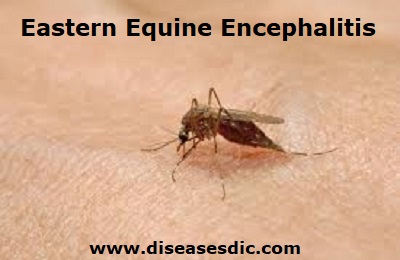What is Eastern Equine Encephalitis?
Eastern Equine Encephalitis (EEE) is a viral illness that can cause inflammation of the brain. Certain birds are reservoirs for this virus; mosquitoes that feed on these birds can carry the virus to people and other animals. Similar to West Nile Virus and St. Louis Encephalitis, a mosquito that bites an infected bird can in turn bite a mammal or a person. EEE can produce severe disease in horses, some game birds and rarely, people. Most cases of EEE in the United States occur in east coast and gulf coast states.
The Eastern Equine Encephalitis (EEE) virus (togavirus family) has long been recognized in the United States, though fewer than 160 cases have been reported in humans in this country in the past 35 years. However, hundreds of equine cases have been reported in South Carolina, and EEE virus has also been isolated from birds and mosquitoes.
Eastern equine encephalitis virus (electron microscopic image revealed the presence of numerous Eastern equine encephalitis virus virions in this specimen of central nervous system tissue)
How is Eastern Equine Encephalitis spread? (Transmission)
EEEV is transmitted through the bite of an infected mosquito. The primary EEEV vector is a swamp mosquito called the blacktailed mosquito (Culiseta melanura) which transmits the virus to birds, or becomes infected by feeding on infected birds in their swampland habitat. One of the most likely EEE vectors to people is the “cattail mosquito” (Coquilleta perturbans) which breeds in cattail marshes, but disease transmission can come from several other floodwater mosquito species that most commonly occur in coastal or swampy areas. Transmission of the EEE virus does not occur directly from person to person.
Who is at risk of Eastern Equine Encephalitis (EEE) illness?
- EEE virus has been reported from the Atlantic to the Gulf Coast states and the Great Lakes region.
- Anyone in an area where the virus is present can get infected with EEE virus from a mosquito bite.
- People who engage in outdoor work and recreational activities in endemic areas are at increased risk of infection.
- Persons over age 50 and under age 15 seem to be at greatest risk for developing severe disease when infected with EEE.
- EEE infection is thought to confer life-long immunity against re-infection to survivors.
Signs and Symptoms
Infection causes non-specific clinical signs and often affects the central nervous system.
- Fever
- Severe depression “sleeping sickness”
- Behavior changes
- Impaired vision
- Circling or head pressing
- Muscle twitches
- Inability to swallow
- Paralysis
- Convulsions, Death
Diagnosis
If you think you or a family member might have EEE, talk with your health care provider.
Healthcare providers diagnose EEE virus infection based on:
- Signs and symptoms
- History of living in or traveling to an area where EEE virus is known to circulate
- History of possible exposure to the mosquitoes that can carry EEE virus
- Laboratory testing of blood or spinal fluid
Your healthcare provider can order tests to look for EEE virus infection or other infections that can cause similar symptoms.
Treatment
- There are no medications to prevent or treat EEE virus infections. Antibiotics are not effective against viruses, such as EEE virus.
- Rest, fluids, and over-the-counter pain medications may relieve some symptoms.
- For severe disease, patients often need to be hospitalized to receive supportive treatment, such as intravenous fluids, pain medication, and nursing care.
Prevention of Eastern Equine Encephalitis
How do I protect myself and my family from Eastern Equine Encephalitis (EEE)?
There is no vaccine against EEE virus for humans. Reducing exposure to mosquitoes is the best defense against infection with EEE and other mosquito-borne viruses. There are several approaches you and your family can use to prevent and control mosquito-borne diseases.
- Use repellent: When outdoors, use insect repellent containing DEET, picaridin, IR3535 or oil of lemon eucalyptus on exposed skin and/or clothing. The repellent/insecticide permethrin can be used on clothing to protect through several washes. Always follow the directions on the package.
- Wear protective clothing: Wear long sleeves and pants when weather permits.
- Install and repair screens: Have secure, intact screens on windows and doors to keep mosquitoes out.
- Keep mosquitoes from laying eggs near you: Mosquitoes can lay eggs even in small amounts of standing water. Get rid of mosquito breeding sites by emptying standing water from flower pots, buckets, barrels, and tires. Change the water in pet dishes and replace the water in bird baths weekly. Drill holes in tire swings so water drains out. Empty children’s wading pools and store on their side after use.

